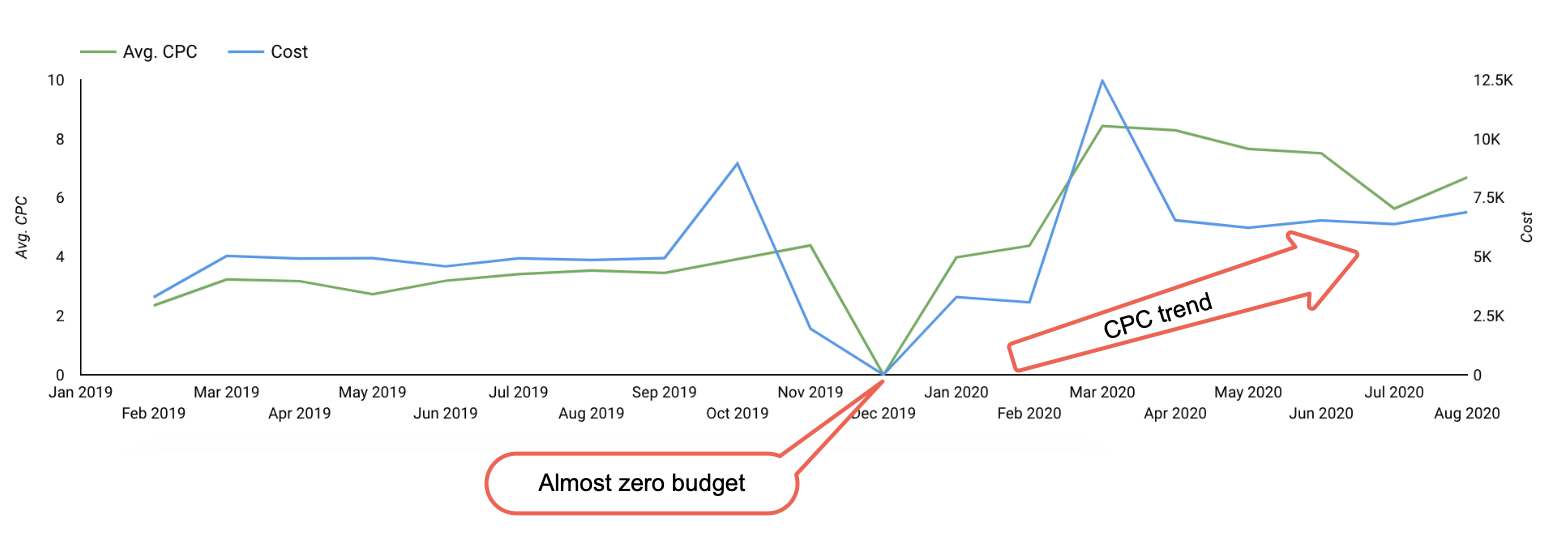It’s not uncommon for clients to approach their PPC agencies with specific requests.
Maybe you’ve heard about some strategy you’d like to try.
Or you’ve read that a certain kind of approach is bad or that a certain metric should be higher or lower than X.
Your PPC agency should welcome your input.
But that doesn’t mean they’ll automatically implement your request.
Because even though you’re the client, they are the PPC pros.
You’re paying them for their expertise.
And that means it’s their job to question (and sometimes push back on) requests that don’t make sense or run counter to your goals – even if those requests sound logical on the surface.
As a PPC agency, we sometimes get specific strategy-related requests from our clients, too.
And while we’re always happy to listen, we don’t automatically accept those requests.
So let me share a few examples of how we handled some of them.
You’ll come away with a better idea of what to expect from your own PPC agency.
Request 1: Pause All Brand Campaigns in Non-U.S. Locations
One of our clients asked us to pause all its brand campaigns in non-U.S. locations.
Their revenue wasn’t strong outside of the U.S., and they had little competition there, they argued.
So why not back off on advertising and rely on organic search to take over?
This request came directly from the CMO, so we complied immediately.
But at the same time, we did some research.
During our next call with the management team, we shared reporting to put their non-U.S. brand campaign spending in perspective.
Here’s what we found:

As you can see, this company spent about $400 on non-U.S. brand campaigns (Canada, UK, and International) from January to October, while earning about $29,000 in revenue from those areas during the same period of time.
Why jeopardize a good thing to save a mere $400?
What if organic doesn’t kick in the way they expect?
Why risk no longer being at the top of SERPs?
Besides, $400 was a drop in the bucket for this company, considering that their monthly PPC budget is around $60,000.
We advised this client that it was better to keep these brand campaigns live.
Request 2: Lower Cost Per Clicks (CPC)
In this case, our client saw his CPCs going up, and he wanted to drive them back down.
He felt he wasn’t getting as much bang for his buck as he had before.
On the surface, this request makes sense.
But at the same time, CPC isn’t a metric we like to focus on particularly.
CPCs can go up for all kinds of reasons. They tend to be an indicator of something else that’s going on with an account.
Alone, they don’t tell you much.
So the bigger question was why CPCs were going up in the first place.
Maybe Google had simply raised its pricing, which happens from time to time.
Or maybe an increase in competition was driving up CPCs. But we saw no evidence of that.
Lower Quality Scores can cause an increase in CPCs, but that wasn’t the case here.
So what was it?
The answer lay in the client’s own Google Ads account.
From October to December of 2019, this client had severely cut back his budget – reducing it to almost nothing for a short period.
When we relaunched with a smaller budget in January 2020, his CPCs started to creep up and that upward trend continued.
You can see the trend in the following graph:

The blue line is budget. The green line is CPC.
Prior to the near-complete account shutdown, CPCs were holding relatively steady.
However, after the shutdown, CPCs came back with a vengeance – reaching new heights and continuing to trend upward and outpacing budget for the most part.
The pandemic might have played into this scenario. But still, this isn’t the first time we’ve seen CPCs trend higher in reaction to campaigns being turned on and off.
We have another client that likes to pause their campaigns for a few months from time to time (against our advice).
Every time we relaunch, CPCs are higher and click volume is sluggish.
It’s a real struggle, and it only gets worse every time we do it.
So what was our advice to this client in light of our experience with other clients?
Rather than focus on CPC, let’s focus on distributing their budget evenly over the course of the year.
Because if they want lower CPCs, stopping and starting campaigns is part of the problem.
Request 3: Random Odd Requests
Sometimes clients come to us with strange, off-the-wall requests.
Getting the odd random request isn’t unusual.
But when they come in a cluster, it’s usually an indication that the client is having the account audited.
Having other agencies audit our client accounts is nothing new, especially if we’ve managed the account for several years.
Audits are common practice in our industry, and we take no offense. It’s part of good due diligence, and we respect that.
Often, our clients are transparent about the process and share audit findings with us, which we appreciate.
But some clients aren’t as transparent.
So when we get a bunch of unusual requests (especially when accompanied by someone new accessing the clients’ Google Ads account), we usually know what’s up.
This happened with one of our clients recently.
First, they asked us to “test four or five landing pages” out of the blue.
But this account is mainly mobile-only ads, so landing pages don’t really apply.
Then they asked us to “improve the Quality Score.”
But again, Quality Score is the wrong metric to focus on here.
While their Quality Score could stand a bump, we didn’t see any obvious updates that could move the dial significantly.
Keyword and ad relevance were both solid.
More weird requests streamed in. And all of them related to things you could see in the Google Ads account.
Zero attention was paid to post-click activities, which is where this account has the most opportunities for optimization.
So how did we handle these requests?
We politely responded to each request, explaining our response to each one, while also trying to gently open the door to greater transparency and communication.
At the same time, this flurry of oddball requests happened to coincide with the rollout of Google’s new call recording functionality, which was a perfect fit for this client.
We worked with the client to put call recording in place and quickly found excellent opportunities to tighten ad scheduling.
We also used it to identify hang-ups and measure hold times and share that information with the client. The client then used it to improve their processes.
The client loved this post-click optimization.
And it helped us put off-the-wall questions about landing pages and Quality Scores to bed.
Consider Your Requests a Starting Point
These examples aren’t intended to discourage you from bringing ideas, requests, and questions to your PPC agency.
Because while your agency might not immediately accept and implement your suggestions, that doesn’t mean they’re not valuable.
Instead, they’re an excellent gateway to deeper conversations about your account.
They’re a valuable means to uncover new or changing objectives, drive transparency, and further your PPC partnership.
So keep those requests coming!
More Resources:
- 15 Ways to Optimize a Paid Search Campaign
- PPC 101: A Complete Guide to PPC Marketing Basics
- 9 Essentials to Make Perfect PPC Reports for Your Clients
Image Credits
Feature Image: Dreamstime.com
All screenshots taken by author, October 2020





